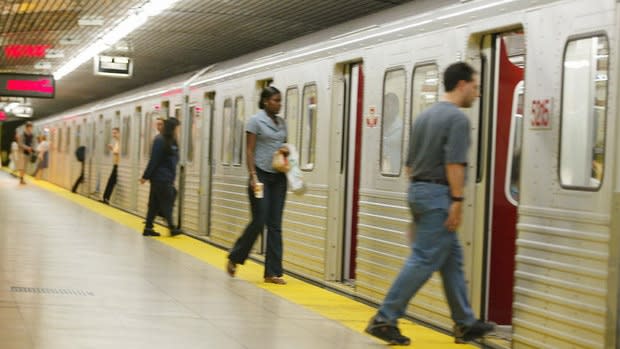Boost funding for 'strong transit system,' advocates tell Ford government
A coalition of advocacy groups and health organizations is calling on Premier Doug Ford to boost transit funding through an open letter to the provincial government before its fall economic statement on Thursday.
Transit watchers expect funding for multiple Toronto projects — from the Finch LRT to the Scarborough subway extension — could be on the table at the midday Queen's Park statement from Finance Minister Vic Fedeli.
"We know this government is going to try and find ways to cut costs … We are concerned that one of the things they may cut back on is public transit," said Gideon Forman, transportation policy analyst at the David Suzuki Foundation.
"We haven't got that sense yet that it's a priority."
The open letter, provided exclusively to CBC Toronto, cites the need for increased funding for a "strong transit system" to reduce traffic congestion and improve air quality.
More than a dozen groups and individuals signed it, including the Toronto Environmental Alliance, the Pembina Institute, the Lung Association of Ontario, Asthma Canada, the Registered Nurses' Association of Ontario, several Canadian developers, John Ruffolo, CEO of OMERS Ventures and a board member for the David Suzuki Foundation, and former Toronto mayor John Sewell.
The coalition's concern over transit cost cutting stems from a spate of early changes made by the Progressive Conservative government, including scrapping Ontario's cap-and-trade program, shrinking Toronto's city council, rolling back labour reforms, and freezing the province's minimum wage.
In the open letter, the coalition notes the province's promise to "maintain current funding as detailed in Ontario's previous transportation and infrastructure budget."
Ford also pledged to inject $5 billion in new subway funding, beyond the $9 billion already coming, to build a three-stop Scarborough subway extension — which would need new federal and municipal support, since a one-stop subway is currently in the works with an estimated cost of $3.35 billion.
The added funding would also go toward the downtown relief line, the province promised, and the Yonge Extension, along with "building future crosstown expansions underground."
Toronto residents 'desperate' for rapid transit
"That's all welcome news, but a couple of subway stops will not help most transit riders who are stuck commuting on the bus for hours," said Shelagh Pizey-Allen, the spokesperson for TTCRiders, another advocacy group who signed the open letter.
"All corners of Toronto are desperate for more rapid transit, but it needs to be built where it's needed the most."
Alongside the long-awaited relief line, she said LRT lines, including those along the waterfront and Eglinton East, need to be "prioritized." Both projects currently lack the necessary funding sources.
Given Ford's preference for underground transit, the future of those lines and the Finch West LRT — which his brother, former Toronto mayor Rob Ford, initially cancelled during his time in office until city council voted to restore the project — are uncertain.

Ford also promised to upload responsibility for Toronto's subway system to the province, which includes building and maintaining new lines while allowing Toronto to operate the system and keep any revenue generated.
And it's a promise that's moving along: In August, Ford announced the creation of an advisory panel headed by Michael Lindsay, a former vice president of commercial projects at Infrastructure Ontario, which is tasked with delivering the plan.
The Toronto Region Board of Trade has been vocal about its support for provincial transit takeovers in Toronto and beyond, but others aren't convinced Ford's proposal makes financial or practical sense for transit users.
"Breaking the TTC apart will create a two-tier system," warned Pizey-Allen. She said that could mean a system where people pay more to ride the subway and rapid transit, while lower-income people are forced onto slower, less reliable bus routes.
"If the premier wants to fix our transit system, and make it more affordable and reliable, he needs to fund it properly," she said.

